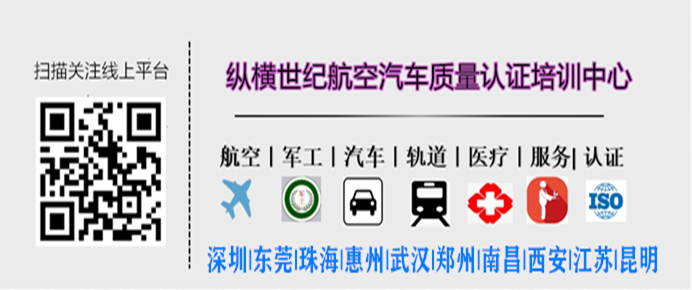
8运行
8.1、运行的策划和控制
为满足产品和服务提供的要求,并实施第6章所确定的措施,组织应通过以下措施对所需的过程(见4.4)进行策划、实施和控制:
a. 确定产品和服务的要求;
注:产品和服务的要求的确定应当考虑:
—— 人身和产品的安全;
—— 可制造性和可检验性;
—— 可靠性、可利用性和可维护性;
—— 用于产品的零部件和材料的适用性;
—— 嵌入式软件的选择和开发;
—— 产品的淘汰性;
—— 多余物的预防、侦测和移除;
—— 处置、包装和防护;
——产品在寿命结束时的回收和最终处理
b. 建立下列内容的准则:
1、过程;
2、产品和服务的接收。
注:根据产品的属性和基于特殊要去,可以使用统计技术已支持:
——设计验证(例如:可靠性、可维护性和产品安全性);
——过程控制;
关键特性的选择和验证;
过程能力测量;
统计过程控制;
试验设计
—— 验证;
—— 失效模式、影响和危害度分析。
c. 确定符合产品和服务要求所需的资源及满足产品和服务的准时交付;
d. 按照准则实施过程控制;
e. 在必要的范围和程度上,确定并保持、保留形成文件的信息:
1、确信过程已经按策划进行;
2、证实产品和服务符合要求。
f. 确定管理关键项目必须的过程和控制,包括关键特性被识别时的生产过程控制。
g. 确保受影响的组织职能代表参与运营的策划和控制;
h. 确定支持产品和服务使用和维护的过程和资源;
i. 确定从外部供方获得的产品和服务;
j. 建立防止不合格产品和服务交付给客户所需的控制。
注:达成运营策划和控制的一个途径可以是使用综合分阶段过程。
当适用组织、客户要求和产品和服务时,组织应以一种结构化和受控的方式策划和管理产品和服务的提供,这种方式包括在有限的资源和时间内,按策划的顺序实施计划事件,并以可接受的风险满足要求。
注:这个活动通常称之为项目策划,项目管理或者计划管理。
策划的输出应适合组织的运行需要。
注:作为策划的输出,对应用于特定产品、服务、项目或合同的质量管理体系的过程和资源作出规定的形成文件的信息可称之为质量计划。
组织应控制策划的变更,评审非预期变更的后果,必要时,采取措施减轻不利影响。
组织应确保外包过程受控(见8.4)。
组织应建立、实施和维持一个过程以策划和控制临时或者永久的工作转移,以确保工作对于要求的持续符合性。该过程应确保工作转移的影响和风险得到管理。
注:对于控制从组织到外部供方,或者从一个外部供方到另一个外部供方的工作转移,参见8.4。对于控制从组织的一处设施到另一处,或者从外部供方到组织的工作转移,参见8.5。
8.1、Operational planning and control
The organization shall plan, implement and control the processes (see 4.4) needed to meet the requirements for the provision of products and services, and to implement the actions determined in Clause 6, by:
a. determining the requirements for the products and services;
NOTE: Determination of requirements for the products and services should include consideration of:
—— personal and product safety;
—— producibility and inspectability;
—— reliability, availability, and maintainability;
—— suitability of parts and materials used in the product;
—— selection and development of embedded software;
—— product obsolescence;
—— prevention, detection, and removal of foreign objects;
—— handling, packaging, and preservation;
—— recycling or final disposal of the product at the end of its life.
b. establishing criteria for:
1. the processes;
2. the acceptance of products and services;
NOTE: According to the nature of the product and depending on the specified requirements, statistical techniques can be used to support:
—— design verification (e.g., reliability, maintainability, product safety);
—— process control;
selection and verification of key characteristics;
process capability measurements;
statistical process control;
design of experiments
—— verification;
—— failure mode, effects, and criticality analysis.
c. determining the resources needed to achieve conformity to the product and service requirements and to meet on-time delivery of products and services;
d. implementing control of the processes in accordance with the criteria;
e. determining, maintaining and retaining documented information to the extent necessary:
1. to have confidence that the processes have been carried out as planned;
2. to demonstrate the conformity of products and services to their requirements.
f. determining the processes and controls needed to manage critical items, including production process controls when key characteristics have been identified;
g. engaging representatives of affected organization functions for operational planning and control;
h. determining the process and resources to support the use and maintenance of the products and services;
i. determining the products and services to be obtained from external providers;
j. establishing the controls needed to prevent the delivery of nonconforming products and services to the customer.
NOTE: One method to achieve operational planning and control can be through using integrated phased processes.
As appropriate to the organization, customer requirements, and products and services, the organization shall plan and manage product and service provision in a structured and controlled manner including scheduled events performed in a planned sequence to meet requirements at acceptable risk, within resource and schedule constraints.
NOTE: This activity is generally referred to as project planning, project management, or program management.
The output of this planning shall be suitable for the organization’s operations.
NOTE: As an output of this planning, documented information specifying the processes of the quality management system and the resources to be applied to a specific product, service, project, or contract can be referred to as a quality plan.
The organization shall control planned changes and review the consequences of unintended changes, taking action to mitigate any adverse effects, as necessary.
The organization shall ensure that outsourced processes are controlled (see 8.4).
The organization shall establish, implement, and maintain a process to plan and control the temporary or permanent transfer of work, to ensure the continuing conformity of the work to requirements. The process shall ensure that work transfer impacts and risks are managed.
NOTE: For the control of work transfer from the organization to an external provider, or from an external provider to another external provider, see 8.4. For the control of work transfer from one organization facility to another, or from an external provider to the organization, see 8.5.
